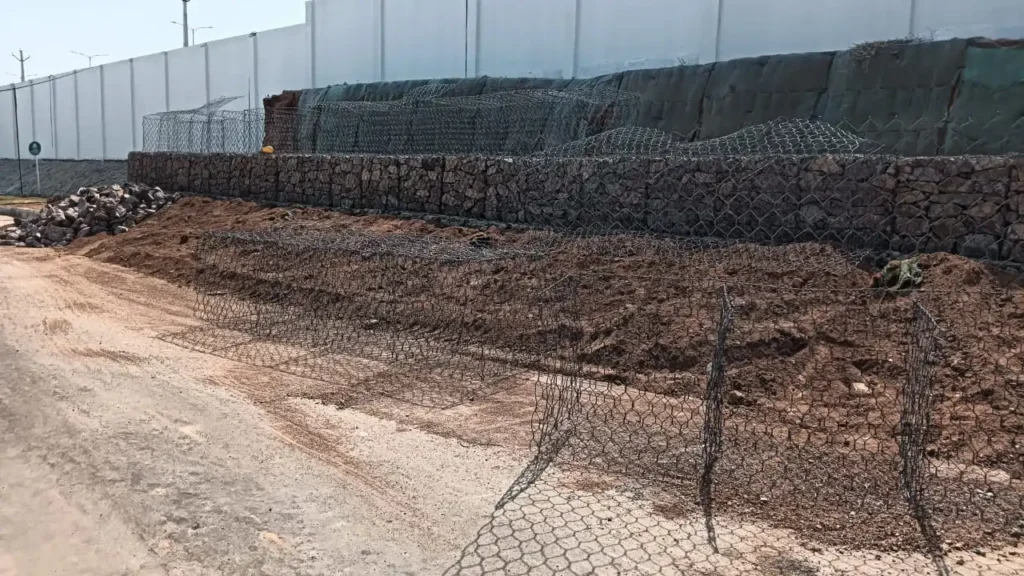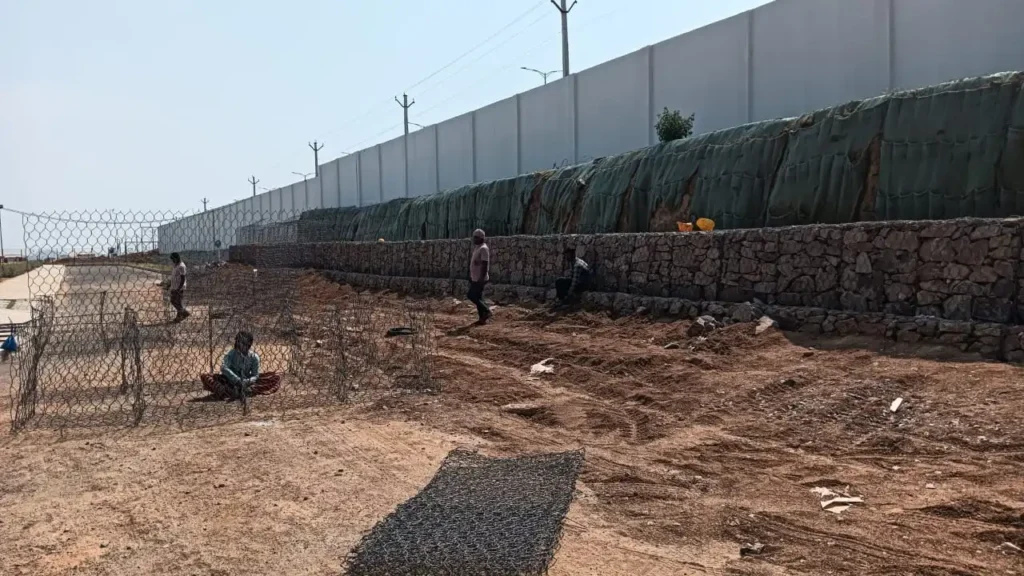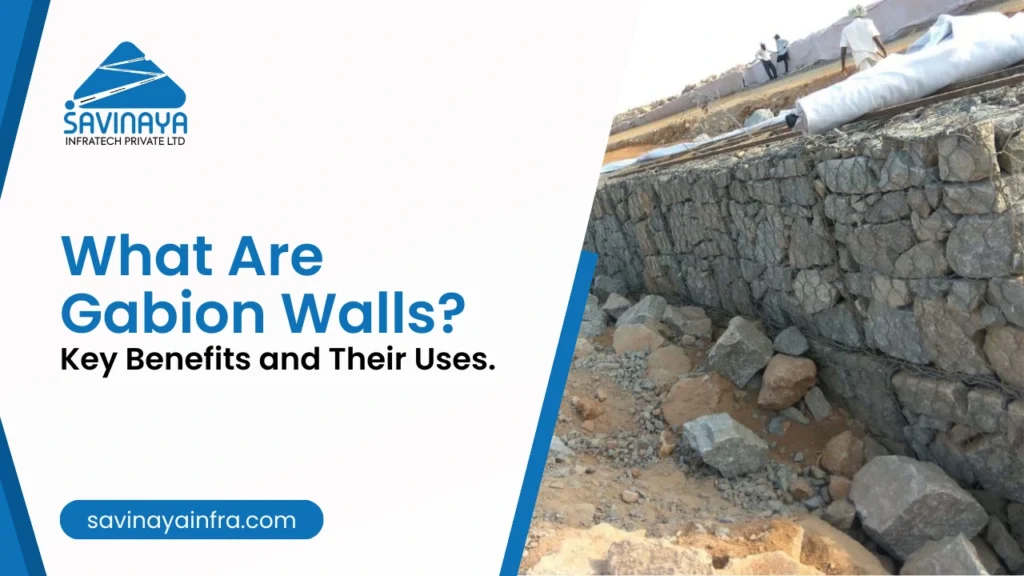You’ve likely come across gabion walls without even realising what they were. These stone-filled wire structures are used in everything from road construction and slope protection to stylish garden designs and boundary walls.
At first glance, they may look like simple cages packed with rocks. But in reality, they offer a smart, flexible, and durable way to manage earth pressure, control erosion, and add structure to both natural and man-made environments.
In this guide, we’ll learn what are gabion walls , the types of stones used, their variations, benefits, applications, pricing, and how to choose the right one for your project.
Table of Contents
What Is a Gabion Wall?
A gabion wall is made by stacking steel mesh boxes that are filled with rocks or similar materials. These walls are used to hold back soil, guide water flow, or prevent erosion on slopes. They are also used to create raised garden beds, seating areas, and noise barriers in modern construction.
Unlike rigid walls that can crack over time, gabion walls are designed to allow slight movement. This gives them added strength and durability, especially in areas with soft soil, high water flow, or frequent changes in ground pressure.
What Kind of Stone is Used in a Gabion Wall?
The stones used in a gabion wall are more than just filler. They provide the structure and strength needed to keep the wall stable. Choosing the right gabion wall materials is key to long-lasting performance.
Here are some of the most commonly used stones:
- Crushed granite or basalt – These are dense, strong, and long-lasting. They work well in walls that need to support heavy loads or stand up to harsh weather.
- Smooth river stones – Often used in decorative walls, these rounded stones give a softer, more natural look. They are popular in landscaping projects.
- Recycled concrete – A practical and cost-effective option. It is used in large projects where appearance is not the top priority.
- Sandstone or locally available stone – These can reduce costs and blend well with the natural surroundings.
No matter which stone is chosen, it must be large enough to stay in place within the mesh and strong enough to resist breaking down over time. The stones also help create natural drainage, which prevents water buildup behind the wall.
You can also read: What Is Soil Nailing & Its Advantages for Slope Stability?
Types of Gabion Walls
Gabion walls come in different types based on their design, size, and purpose. Here are the most common ones:
1. Gravity Gabion Walls
These walls use their own weight to stay in place. They are wide at the base and taper toward the top, making them ideal for holding back large amounts of soil on slopes.
2. Mattress-Type Gabions
These are flatter and spread out over a large surface area. They are used to cover riverbanks or slopes to prevent erosion, especially during heavy rains.
3. Stacked Gabion Baskets
These are neat, uniform boxes stacked to build vertical or stepped walls. They are commonly used in both landscaping and light structural applications.
4. Reinforced Gabion Walls
These are built with additional support, such as geogrids or steel anchors. They are suitable for sites that need extra strength, like highways or large retaining systems.
Different types are meant to handle different site challenges. Some are meant to support heavy soil loads, while others are used more for surface protection or decorative purposes.
Interesting reads: Soil Nailing or Soil Anchoring: Which Is Right for You?
Key Benefits of Using Gabion Walls

There are many good reasons why gabion walls have become a preferred choice in both infrastructure and private projects. Here are some of the top gabion wall benefits:
1. Strength and Longevity
The combination of rock and steel mesh creates a structure that can handle both natural and man-made pressures over time.
2. Natural Drainage
Water can pass through the gaps between the stones. This helps avoid the buildup of pressure behind the wall and reduces the risk of water damage.
3. Flexibility
These walls can adjust slightly with soil movement. This prevents cracks and extends the wall’s lifespan in areas with shifting ground.
4. Low Maintenance
Once built, gabion walls require very little care. There is no need for painting, sealing, or frequent repair.
5. Eco-Friendly
The use of recycled or local stones keeps the environmental impact low. Over time, plants can grow through the gaps, blending the wall with its surroundings.
6. Good Looks
These walls offer a natural, earthy appearance. With the right stone selection, they can become a central feature in landscaping or outdoor design. This balance of form and function makes gabion walls a strong option for a wide variety of needs.
How Long Will a Gabion Wall Last?
A well-built gabion wall can easily last 50 to 100 years. Its lifespan depends on the quality of materials used, especially the wire mesh. If the mesh is galvanized or PVC-coated and the wall is installed correctly, it can handle decades of exposure to weather and moisture without major issues.
Application or Uses of Gabion Walls

The uses of gabion walls are wide-ranging. They are found in both large-scale construction and small personal projects. Some common applications include:
- Stabilising slopes and embankments
- Preventing erosion along riverbanks or canal sides
- Supporting roads, railways, and basements
- Flood protection near water bodies
- Building garden walls, seats, or decorative features
- Reducing noise in urban areas when used as sound barriers
Thanks to their simple design and adaptability, gabion walls can be shaped and sized to fit almost any type of land or layout.
What is the Purpose of a Gabion Wall?
The main purpose of a gabion wall is to hold back soil, manage water flow, or prevent erosion. They are also used in landscaping to build seating, steps, boundary walls, or simply to add texture and visual interest to outdoor spaces.
Gabion Walls vs Retaining Walls: What Are the Differences?
When comparing gabion wall vs retaining wall, there are some clear differences in how they are built and how they perform:
| Feature | Gabion Walls | Traditional Retaining Walls |
| Construction | Made with steel mesh and filled with rock | Built from concrete, brick, or stone |
| Drainage | Water flows naturally through gaps | Often needs added drainage systems |
| Flexibility | Adapts to ground movement | Rigid and can crack |
| Maintenance | Requires little to no upkeep | Needs sealing and repairs over time |
| Appearance | Natural and customisable | More formal or industrial in look |
So, in deciding between gabion vs retaining wall, it often comes down to the site’s needs, the desired look, and the budget.
How Much Does a Gabion Wall Cost?
In India, gabion walls cost anywhere between ₹800 to ₹1,800 per square foot. The total price depends on several factors:
- Type and size of stones used
- Wall height and width
- Labour charges in your region
- Site conditions and ease of access
- Quality of steel mesh and fittings
While the upfront cost may vary, gabion retaining walls offer excellent value over time because they require less maintenance and last for decades when built properly.
Choosing the Right Gabion Wall for Your Project
Selecting the right gabion wall depends on what you want to achieve. Start by asking a few key questions:
- Is the wall supporting soil, protecting against water, or adding to the design?
- What is the soil type and how well does the site allow water to drain?
- Do you need the wall to hold heavy loads or just look good?
- What kind of stones are available nearby?
Working with experienced engineers or a gabion wall contractor will help you get the right design, the right materials, and a long-lasting result.
Why Choose Savinaya Infratech for Your Gabion Wall Projects?
At Savinaya Infratech, we take pride in delivering gabion walls solutions that are not only strong but also suited to the land and the people using it. Here is what we offer when you work with us:
- Custom-built designs based on your site and goals
- Experienced teams who have handled projects across India, from highways and rail lines to gardens and resorts
- Top-quality materials that meet both design and safety standards
- Clear pricing with no hidden costs
- On-time completion, no matter the project size
If you are planning a gabion structure, we’re here to help you build it right the first time.
Conclusion
Gabion walls are a smart choice for anyone looking to build with strength, flexibility, and a touch of natural beauty. They manage earth pressure, control erosion, and add character to landscapes; all while being cost-effective and easy to maintain.
When built using the right materials and guidance, gabion walls can last for decades and blend beautifully into any environment. Whether you’re supporting a slope or upgrading your garden, gabions might be just what your project needs. Need Help Choosing or Building a Gabion Wall? Speak with the team at Savinaya Infratech. We’re ready to help you plan, build, and succeed.
FAQs
1. Are gabion walls cheaper than concrete walls?
In many cases, gabion walls are more affordable than concrete retaining walls. The cost depends on the design and materials, but since gabions need less formwork, equipment, and labour, they often turn out to be the budget-friendly choice, especially for larger or sloped sites.
2. Do you need a foundation for a gabion wall?
Yes, but not a deep or complicated one. Unlike traditional concrete walls, gabion walls usually sit on a simple compacted gravel base. This provides enough support and allows proper drainage, making the installation process quicker and easier.
3. Do gabion walls need maintenance?
Gabion walls require very little maintenance. As long as the mesh stays intact and the stones remain in place, there’s not much to do. Over time, plants may grow through the gaps, which many people actually like. If any shifting or sagging occurs, small adjustments can usually fix the issue.
4. Are gabion walls stronger than concrete walls?
Gabion walls are incredibly strong and can handle heavy pressure, especially when built correctly. While concrete walls may have higher compressive strength, gabions offer better flexibility, drainage, and long-term stability in areas with soil movement or water presence.
5. Is Gabion wall better than a retaining Wall?
That depends on your project needs. Gabion walls are more flexible, allow better drainage, and usually cost less to install. Traditional retaining walls might be better for high-load areas or formal designs. For natural-looking landscapes, uneven terrain, or areas with water flow, gabions are often the preferred choice.


